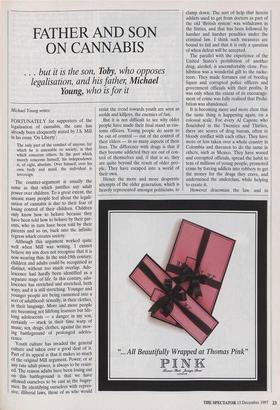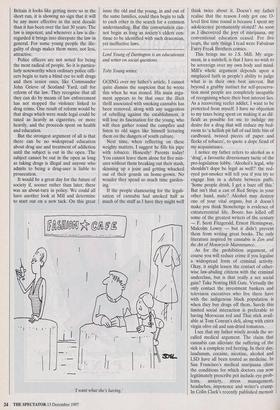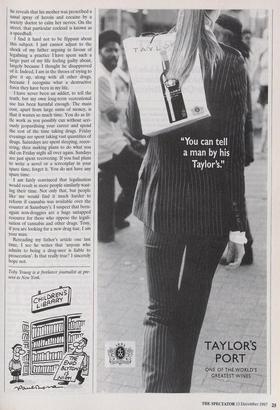FATHER AND SON ON CANNABIS
. . . but it is the son, Toby, who opposes legalisation, and his father, Michael Young, who is for it Michael Young writes: FORTUNATELY for supporters of the legalisation of cannabis, the case has already been eloquently stated by J.S. Mill in his essay 'On Liberty':
The only part of the conduct of anyone, for which he is amenable to society, is that which concerns others. In the part which merely concerns himself, his independence is, of right, absolute. Over himself, over his own body and mind, the individual is sovereign.
The counter-argument is usually the same as that which justifies any adult power over children. To a great extent, the unease many people feel about the legali- sation of cannabis is due to their fear of losing control of their children. Children only know how to behave because they have been told how to behave by their par- ents, who in turn have been told by their parents and so on, back into the infinite regress which creates society.
Although this argument worked quite Well when Mill was writing, I cannot believe my son does not recognise that it is now wearing thin. In the mid-19th century, Children and adults could be recognised as distinct, without too much overlap. Ado- lescence had hardly been identified as a separate stage of life. In this century, ado- lescence has stretched and stretched, both ways, and it is still stretching. Younger and Younger people are being cannoned into a sort of adulthood: sexually, in their clothes, in their language. More and more people are becoming not lifelong learners but life- long adolescents — a danger in my son, certainly — stuck in their time warp of music, sex, drugs, clothes, against the mov- ing battleground of prolonged adoles- cence.
Youth culture has invaded the general culture and taken over a good deal of it. Part of its appeal is that it makes so much of the original Mill argument. Power, or at any rate adult power, is always to be resist- ed. The reason adults have been losing out on this battleground is that we have allowed ourselves to be cast as the bogey- men. By identifying ourselves with repres- sive, illiberal laws, those of us who would resist the trend towards youth are seen as scolds and killjoys, the enemies of fun.
But it is not difficult to see why older people have made their final stand as cus- toms officers. Young people do seem to be out of control — out of the control of their elders — in so many aspects of their lives. The difference with drugs is that if they become addicted they are out of con- trol of themselves and, if that is so, they are quite beyond the reach of older peo- ple. They have escaped into a world of their own.
Hence the more and more desperate attempts of the older generation, which is heavily represented amongst politicians, to clamp down. The sort of help that heroin addicts used to get from doctors as part of the old 'British system' was withdrawn in the Sixties, and that has been followed by harsher and harsher penalties under the criminal law. I think such measures are bound to fail and that it is only a question of when defeat will be accepted.
The parallel with the experience of the United States's prohibition of another drug, alcohol, is uncomfortably close. Pro- hibition was a wonderful gift to the racke- teers. They made fortunes out of bootleg liquor and corrupted police officers and government officials with their profits. It was only when the extent of its encourage- ment of crime was fully realised that Prohi- bition was abandoned.
It is becoming more and more clear that the same thing is happening again, on a colossal scale. For every Al Capone who flourished in the Twenties and Thirties, there are scores of drug barons, often in bloody conflict with each other. They have more or less taken over a whole country in Colombia and threaten to do the same in others, such as Mexico. They have wooed and corrupted officials, spread the habit to tens of millions of young people, promoted crime by forcing addicts into robbery to get the money for the drugs they crave, and undermined the underclass, while helping to create it.
However draconian the law, and in Britain it looks like getting more so in the short run, it is showing no sign that it will be any more effective in the next decade than it has been over the last 30 years. The law is impotent, and whenever a law is dis- regarded it brings into disrepute the law in general. For some young people the ille- gality of drugs makes them more, not less, attractive.
Police officers are not noted for being the most radical of people. So it is particu- larly noteworthy when ordinary police offi- cers begin to turn a blind eye to soft drugs and then senior ones, like Commander John Grieve of Scotland Yard, call for reform of the law. They recognise that all they can do by means of law enforcement has not stopped the violence linked to drug crime. One result of reform would be that drugs which were made legal could be taxed as heavily as cigarettes, or more heavily, and the proceeds spent on health and education.
But the strongest argument of all is that there can be no widespread education about drug use and treatment of addiction until the subject is out in the open. The subject cannot be out in the open as long as taking drugs is illegal and anyone who admits to being a drug-user is liable to prosecution.
It would be a great day for the future of society if, sooner rather than later, there was an about-turn in policy. We could all have another look at Mill and determine to start out on a new tack. On this great issue the old and the young, in and out of the same families, could then begin to talk to each other in the search for a common understanding. But this conversation can- not begin as long as society's elders con- tinue to be identified with such draconian, yet ineffective laws.
Lord Young of Dartington is an educationist and writer on social questions.
Toby Young writes: GOING over my father's article, I cannot quite dismiss the suspicion that he wrote this when he was stoned. His main argu- ment appears to be that once the illicit thrill associated with smoking cannabis has been removed, along with any suggestion of rebelling against the establishment, it will lose its fascination for the young, who will then gather round the campfire and listen to old sages like himself lecturing them on the dangers of youth culture.
Next time, when reflecting on these weighty matters, I suggest he fills his pipe with tobacco. Honestly! Parents today! You cannot leave them alone for five min- utes without them breaking out their stash, skinning up a joint and getting whacked out of their gourds on home-grown. No wonder they spend so much time garden- ing.
If the people clamouring for the legali- sation of cannabis had smoked half as much of the stuff as I have they might well 'I want what she's having.' think twice about it. Doesn't my father realise that the reason I only got one 0- level first time round is because I spent my adolescence permanently stoned? As soon as I discovered the joys of marijuana, my conventional education ceased. For five years, the only things I read were Fabulous Furry Freak Brothers comics.
This brings me to J.S. Mill. My argu- ment, in a nutshell, is that I have no wish to be sovereign over my own body and mind. Mill's whole argument depends upon a misplaced faith in people's ability to judge what is in their own best interest. But beyond a grubby instinct for self-preserva- tion most people are completely incapable of recognising where their best interest lies. As a recovering reefer addict, I want to be protected from myself. I have no objection to my taxes being spent on making it as dif- ficult as possible for me to indulge my desire for a drug that will reduce my bed- room to 'a hellish pit full of sad little bits of cardboard, twisted pieces of paper and flecks of tobacco', to quote a dope fiend of my acquaintance.
I notice my father refers to alcohol as a 'drug', a favourite diversionary tactic of the pro-legislation lobby. 'Alcohol's legal, why shouldn't dope be legal as well?' the red- eyed pot-smoker will tell you if you try to engage him in a debate between puffs. 'Some people drink, I get a buzz off this.' But isn't that a can of Red Stripe in your other hand, mate? Alcohol may destroy one of your vital organs, but it doesn't make you think Stonehenge is evidence of extraterrestrial life. Booze has killed off some of the greatest writers of the century — F. Scott Fitzgerald, Ernest Hemingway, Malcolm Lowry — but it didn't prevent them from writing great books. The only literature inspired by cannabis is Zen and the Art of Motorcycle Maintenance.
As for the prohibition argument, of course you will reduce crime if you legalise a widespread form of criminal activity. Okay, it might lessen the contact of other- wise law-abiding citizens with the criminal underclass, but is that really a net social gain? Take Notting Hill Gate. Virtually the only contact the investment bankers and television executives who live there have with the indigenous black population is when they buy drugs off them. Surely this limited social interaction is preferable to having Moroccan red and Thai stick avail- able at Tom Conran's deli, along with extra virgin olive oil and sun-dried tomatoes.
I see that my father wisely avoids the so- called medical argument. The claim that cannabis can alleviate the suffering of the sick is a complete red herring. In their day, laudanum, cocaine, nicotine, alcohol and LSD have all been touted as medicine. In San Francisco's medical marijuana clinic the conditions for which doctors can now legitimately prescribe pot include eye prob- lems, anxiety, stress management, headaches, impotence and writer's cramp. In Colin Clark's recently published memoir he reveals that his mother was prescribed a nasal spray of heroin and cocaine by a society doctor to calm her nerves. On the street, that particular cocktail is known as a speedball.
I find it hard not to be flippant about this subject. I just cannot adjust to the shock of my father arguing in favour of legalising a practice I have spent such a large part of my life feeling guilty about, largely because I thought he disapproved of it. Indeed, I am in the throes of trying to give it up, along with all other drugs, because I recognise what a destructive force they have been in my life.
I have never been an addict, to tell the truth, but my own long-term recreational use has been harmful enough. The main cost, apart from large sums of money, is that it wastes so much time. You do as lit- tle work as you possibly can without seri- ously jeopardising your career and spend the rest of the time taking drugs. Friday evenings are spent taking vast quantities of drugs. Saturdays are spent sleeping, recov- ering, then making plans to do what you did on Friday night all over again. Sundays are just spent recovering. If you had plans to write a novel or a screenplay in your spare time, forget it. You do not have any spare time.
I am fairly convinced that legalisation would result in more people similarly wast- ing their time. Not only that, hut people like me would find it much harder to reform if cannabis was available over the counter at Sainsbury's. I suspect that born- again non-druggies are a huge untapped resource for those who oppose the legali- sation of cannabis and other drugs. Tony, If you are looking for a new drug tsar, I am your man.
Rereading my father's article one last time, I see he writes that 'anyone who admits to being a drug-user is liable to prosecution'. Is that really true? I sincerely hope not.
Toby Young is a freelance journalist at pre- sent in New York




















































































 Previous page
Previous page